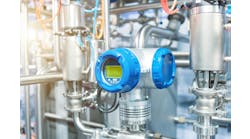Materials engineering company Morgan Advanced Materials joined forces with Loughborough University to investigate the use of alumina blocks in new generation ultrasonic flow meters. Together, Morgan and Loughborough University's Advanced Ceramics Research Group are exploring the potential use of reflective alumina blocks instead of the stainless steel blocks which are currently widely used in these applications.
High performance ultrasonic flow meters have many applications, but in particular they are used in smart meters for utility and industrial flow measurement. Given the roll-out of smart meters worldwide, there is increased demand for accurate, reliable and durable ultrasonic flow meters. Ultrasonic flow meters benefit from greater sensitivity, accuracy and longevity due to the absence of any moving parts. The meter calculates the flow rate of a medium, generally a liquid or gas, by assessing the delay in response between the two sensors, which are driven by electricity to create ultrasonic waves. Traditionally, stainless steel has been used in the process, but as new technologies and possibilities come into view, it is important to investigate their qualities.
Together, the two organisations evaluate the degradation of stainless steel and alumina ceramics, through a test that simulates 20 years of service within a flow tube.
According to Dr. Yifei Zhang of Morgan Advanced Materials, " the accurate measurement of volume flow is important in many sectors, but at the moment there is particular interest in smart meters. This growing commercial application fuels demand for highly accurate meters that are cost-effective and durable which require novel materials to be applied in innovative new ways. We are proud to be working with Loughborough University on the type of research that will take technical ceramics – and ultrasonic flow meters – into the future."



